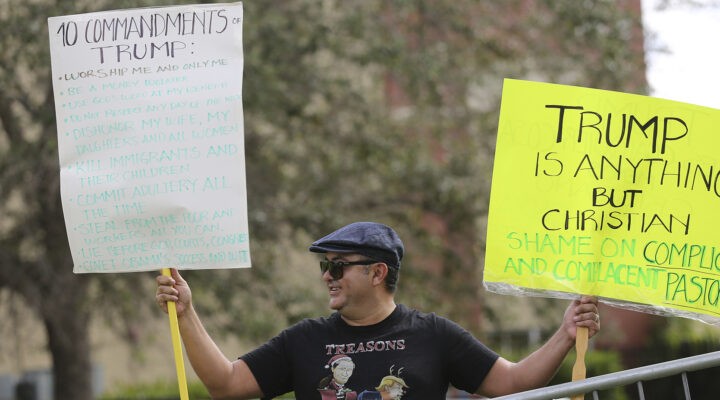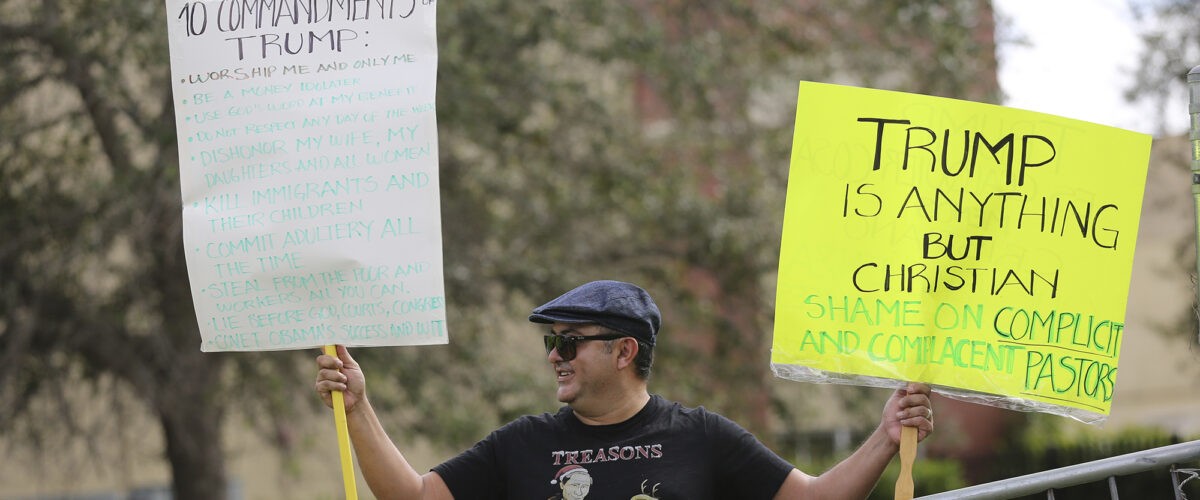What do you call an evangelical Christian who hasn’t bought into Trumpism?
Rare. And likely frustrated.
Ever since the ascendance of Donald Trump as the Republican Party presidential nominee in 2016, a chasm has been exposed among a once-loosely defined group known as evangelical Christians. And now, after four years of a Trump presidency and facing the anniversary of the Trump-inspired insurrection at the U.S. Capitol on Jan. 6, 2021, the gap is wider than ever.
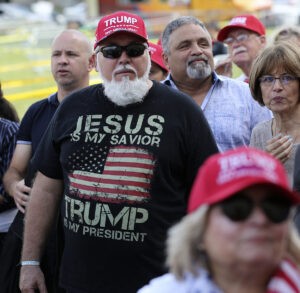
Jorge Alfonso, 56, of Miami, waits in line outside of the King Jesus International Ministry church where President Donald Trump was holding a rally for evangelical supporters, Friday, Jan. 3, 2020, in Miami. (AP Photo/Lynne Sladky)
News outlets often are blamed for perpetuating the story that “white evangelical Christian” equates with “Trump voter.” That blanket language upsets a relatively small group of evangelicals who aren’t Trump loyalists and resent being labeled as such.
But there’s lots of data to back up the association, beginning with the fact that, depending on the poll, 75% to 85% of white evangelicals voted for Trump in the 2020 presidential election. That means eight out of 10 white evangelicals voted to return the most controversial and combative president of modern history to the White House.

Robert P. Jones (Photo by Noah Willman)
“Many white, non-Hispanic evangelicals who are not Trump supporters may not realize what a small minority they have become among their co-religionists,” explained BNG columnist Robert P. Jones, founder of Public Religion Research Institute and author of the book White Too Long.
“The overwhelming majority of white evangelicals are not just Republicans but Trump Republicans,” he added. “They have paved the road and given moral legitimacy for Trump’s takeover of the Republican Party.”
While there are those white evangelicals who held their noses and voted for Trump while disliking his character or even some of his harsh policies, that is an extremely small group, Jones said. “Pew’s validated voter study of the 2020 election, for example, shows white evangelical Protestants voted 84% for Trump, only 15% for Biden. In addition to giving Trump their support, two-thirds (67%) hold a favorable view of Trump, even after Trump’s lies about losing the election and his encouragement of political violence on Jan. 6 in an attempt to overthrow the 2020 presidential election. And 60% believe the Big Lie that the 2020 election was stolen from Donald Trump.”
That gap between the 67% of white evangelicals who still hold a favorable view of Trump and the 84% who voted for Trump illustrates just one of the possible subgroups when considering the breakdown of evangelical Christians in America today.
Four kinds of evangelicals
Thom Rainer, a veteran religion researcher and founder of Church Answers, breaks evangelicals into four distinct subgroups related to Trump and Trumpism:
- Trump Enthusiasts. “This category would be part of Trump’s base, and it seems to be the largest number among evangelicals. They are outspoken in their support of Trump. My anecdotal estimate is that they account for around 60% of evangelicals.”
- Trump Quiets. “This group of evangelicals voted for Trump, but they did not vocalize their support. They tended to vote on the economic platform or a social issue such as abortion. Anecdotally, I estimate their number to be about 20% of evangelicals.”
- Non-Trump Crossovers. “This group of evangelicals not only did not vote for Trump, they also voted for the Democratic candidate (Clinton and Biden). They tend to be outspoken in their opposition to Trump. My information is anecdotal, but I estimate they account for 15% of evangelicals.”
- Politically Homeless Evangelicals. “This category would include those evangelicals who could vote for neither Trump nor his Democratic opposition. They either voted for an independent candidate, wrote in a candidate, or did not vote at all. Although this group got some media attention, I would be surprised if they were more than 5% of evangelicals.”
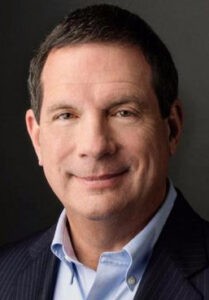
Thom Rainer
In Rainer’s assessment, the Trump Quiets make up the largest subgroup apart from the Trump Enthusiasts, and that is a different mindset than being politically homeless.
In almost any other socio-political scenario, 15% to 20% of a group like white evangelicals would be a force to reckon with, even a force that could swing elections and ideas. But the unified front of eight out of 10 white evangelicals lined up with Trumpism all but drowns them out — in part because everyone else sees the whole lot of them as “evangelicals.”
An evangelical by any other name
So what might we call the non-Trump evangelicals to better differentiate them?
That is an “amazingly complex” question, according to BNG columnist David Gushee, ethics professor at Mercer University and author of the book After Evangelicalism.
“The definition of ‘evangelical’ was always slippery, but now (as Robert Jones has shown) has been transmogrified into a white reactionary nationalism thing,” he said. “So you don’t have to be a churchgoer or read the Bible or love Jesus or stay faithful to your spouse to be an evangelical — you just have to be a white reactionary nationalist who identifies strongly with Trump.”
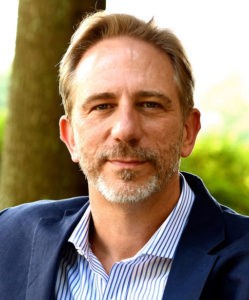
David Gushee
Nevertheless, those evangelicals who don’t fit this new profile “are real and they need to be respected,” Gushee added. These are the Christians who are evangelicals by “more traditional pietistic, historical or scholarly standards. Probably a lot of them are older.”
Among Southern Baptists and former Southern Baptists like the founders of the Cooperative Baptist Fellowship, there are people who have not given up the evangelical identity but are not Trumpists, he continued. “Where you will find these people among white Southern Baptists is in the non-Trumpist part of the SBC (admittedly small) and the non-liberal part of the CBF. That’s a lot of people, and they are kind of homeless, or at least increasingly marginalized.”
Also within this group, however, are people “who have learned enough about Trumpvangelicals to be troubled and wonder whether to keep the evangelical identity for themselves,” Gushee said. “But they are not theologically adventurous, not deconstructing, not post-Christian. They may not call themselves ‘evangelical’ anymore, but they are different from those other groups.
“This group is not reactionary racist, homophobic or sexist, but they also have not bought the whole progressive package. They are open, exploratory on some of these issues, trying not to shut out new learning but also fairly allergic to the ultra-woke. Think of them as the centrist Biden voters who also could have considered voting for a Romney or McCain. An endangered species, for sure.”
But once again, what to call these non-Trumpist evangelicals?
“You might call them ‘classic evangelical’ or ‘old-time evangelical’ or ‘pre-Trump evangelical,’” Gushee suggested.

Kevin Singer
Kevin Singer is someone who personally identifies as an evangelical and sees the problem of labeling up close. In addition to work with a religion research organization, he’s co-director of Neighborly Faith, an organization promoting friendships between evangelicals and people of other faiths.
“In my work with Neighborly Faith, I call these evangelicals ‘committed Christians,’ ‘gospel-centered Christians,’ ‘Christ-centered Christians,’ or ‘theologically conservative Christians,’” he said. “I think terms like these capture the theological conservatism of evangelicalism without compounding it with MAGA politics.”
A history of name changes
One of the problems with finding a new name is the history of the very word “evangelical,” according to BNG columnist Bill Leonard, a church historian and retired dean of the Wake Forest University School of Divinity.
“The term ‘evangelical’ as a descriptor for a conversionist Protestant subgroup really gained usage when certain conservative Christians wanted to distinguish themselves from fundamentalists, hard-right Christians who co-opted many of their dogmas on conversion, Scripture, etc.,” Leonard explained, citing early evangelicals such as Billy Graham, Harold Ockenga and Harold Lindsell.

Bill Leonard
“Thus there is precedent for changing terms in their own camp,” he added. “The term ‘Protestant conversionists’ might be a starter. Some have already done that with the whole ‘Reformed Baptist’ crowd, but they lean fundamentalist/Trumpian, and that name associated them with Calvinism, something Free Methodists and Pentecostals probably couldn’t accept.”
Whatever names are used, “the non-Trump evangelicals would do well to acknowledge that the term ‘evangelical’ is now more political than theological in this country, so they need to decide what alternative terms are more appropriate to them. They have lost the ability to claim that name, much as Republicans have lost claim to that name sans Trumpian ideology.”
And like it or not, the term “white evangelical” is so significantly associated in popular usage with Trump-style Christian nationalism that it is not redeemable by more classic evangelicals, Leonard said, citing a lesson from recent history. “Long ago, folks like Jim Wallis and Sojourners tried to redefine/reclaim the name evangelical, not without great difficulty. I’ve wondered if the term ‘salvation-justice Christians’ might be a term for that kind of evangelical crowd.”
Where’s the line?
While many Trump-supporting evangelicals are not shy to identify their loyalties, others are culturally cautious enough to avoid being labeled. They might quickly declare, “I’m not that kind of evangelical.”
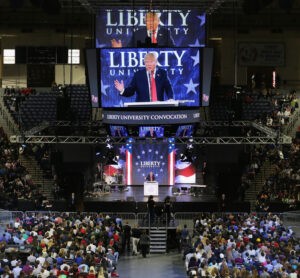
Republican presidential candidate Donald Trump delivers the convocation at the Vines Center on the campus of Liberty University Jan. 18, 2016, in Lynchburg, Va. (Photo by Chip Somodevilla/Getty Images)
How, then, should observers know the difference between the various subgroups of evangelicals — particularly white evangelicals?
Singer suggests asking whether an evangelical “believes that racism and bigotry can be both individual and corporate. If an evangelical says that racism, for example, is individual sin but cannot infect an entire institution or culture, I think it’s worth some introspection about how effective they’ll really be toward dismantling racism (and forces like it) within the evangelical church.”
As a self-described evangelical, he said, “it’s critical that leaders and influencers do some soul-searching about how much they’ve leveraged the evangelical platform to raise their own profile before they start throwing rocks and tearing it down. It’s much easier to say, ‘I’ve never been one of them!’ than to admit that you’ve been complicit along with others, and to leverage the relationships and trust you’ve built on the inside to create change.”
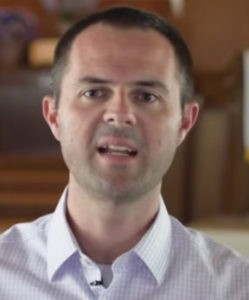
Ryan Burge
Baptist pastor and religion statistician Ryan Burge, author of the definitive text on The Nones, suggests three questions to ask a self-identified evangelical that will separate them into camps:
- Is Joe Biden the legitimate president of the United States?
- Have you gotten the COVID-19 vaccine?
- Do you think there should be less legal immigration to the United States?
“From all the data that I’ve seen, I would guess that two-thirds of self-identified evangelicals would fall into the MAGA camp using this criterion,” Burge explained. “And I think it’s more appropriate to label this new group — they are the ones who have clearly strayed from the traditional understanding.
“’MAGA evangelicals’ seems like an appropriate moniker. People immediately know what I am talking about when I use that term.”
The danger behind the words
One of the reasons non-Trump evangelicals often cite for their frustration over being lumped in with a kind of evangelicalism they don’t know is the realization of how toxic it appears to all those outside Trump’s orbit.
Jones reiterated that PRRI’s research has identified multiple correlations between evangelical support for Trump and belief in other troubling ideas.
For example, 57% of white evangelicals believe left-wing activists (57%) rather than white supremacist groups (37%) or Trump (26%), are primarily responsible for the violent actions of the rioters who took over the U.S. Capitol building on Jan. 6 — despite zero evidence to validate such claims.
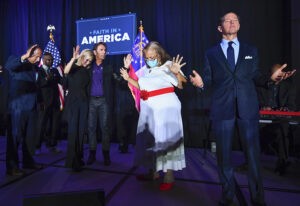
From right, Ralph Reed, Alveda King, Journey keyboardist Jonathan Cain, and personal pastor to the president, Paula White Cain, and others pray on stage during a Donald Trump campaign event courting devout conservatives by combining praise, prayer and patriotism in Alpharetta, Ga. (AP Photo/John Amis)
Or the fact that one in four white evangelicals believe in QAnon conspiracy theories and that “true American patriots” may have to resort to violence to save the country.
Or the fact that 75% of white evangelicals believe that God has granted America a special role in human history. “This view is positively correlated with support for Trump, political violence and the belief that the 2020 election is stolen,” Jones said. “A central tenet of Trump’s MAGA appeal is white Christian nationalism, the idea that America was intended by God to be a white Christian promised land.”
The result, he said, is “the development of MAGA Christian tribalism, where fealty to Trump and a belief in a white Christian America dominates everything else.”
He added: “It’s notable that the Republican Party has declined to put forward an official party platform in the era of late Trumpism. Something similar has happened within white evangelicalism, where so many religious leaders are willing to either distort Christian doctrine beyond recognition, or declare it irrelevant, to support Trump’s whims, bigotry and lies.
“Here’s a test. If white evangelical Christians put up even the most basic set of moral and democratic principles they expected all public leaders to follow and character traits they expected them to exhibit, could Trump possibly clear that bar? The fact that two-thirds of white evangelicals nonetheless continue to support Trump is a sign of the peril not only our democracy, but our faith, is in.
“My hope is that those — like me — who feel the sting and pain of these realities will use this energy not to complain about misrepresentation but to shoulder the responsibility to help our fellow Christians, who are lost, find their way back from the brink.”
Related articles:
California and the making of American evangelicalism |Analysis by Andrew Gardner
Six ways to survive the fall of evangelicalism and the rise of emergence | Opinion by Patrick Wilson
From 2016 to 2020, Trump grew in support from white evangelicals
Who needs the church when we have the biblical worldview? | Analysis by Jacob Alan Cook

